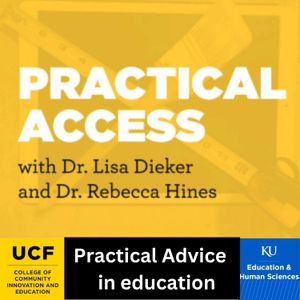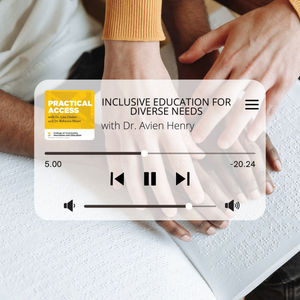Recent Episodes
This episode of Practical Access discusses Drs. Lisa Dieker & Rebecca Hines' Federal Grant project called FLIGHT STEM Coaching, which focuses on assisting math and science coaches in supporting special education teachers. The project utilizes a tool called Debriefscape, offering a comprehensive coaching and professional development approach.
FLIGHT STEM Coaching with Debriefscape represents an innovative approach to professional development and coaching in special education. By combining video technology, targeted resource gathering, and a flexible coaching model, the project aims to enhance math and science teaching in special education settings. The episode encourages educators to explore and adapt these tools to their individual and institutional needs, contributing to the evolution of inclusive and effective teaching practices.
Website: https://www.cs.ucf.edu/~ceh/EDGrants/DScape/
YouTube video: https://www.youtube.com/watch?v=Obw0D0dCJJs
Key Points Discussed:
1. Purpose of FLIGHT STEM Coaching: This initiative aims to aid coaches (including principals) in guiding special education teachers who are teaching math and science. The acronym FLIGHT stands for Flexible Learning through Innovations and Technology in Education, highlighting the project's focus on adaptable and technology-driven educational strategies.
2. Debriefscape as a Coaching Tool: The hosts discuss the utility of Debriefscape in facilitating effective coaching. This tool allows for video recording of teaching sessions, where behaviors can be tagged and reviewed. It is designed for both self-reflection by teachers and for use by coaches in providing targeted feedback.
3. Professional Development Resources: The project includes resources for teachers to pursue their professional development independently, moving away from a top-down coaching model to a more personalized approach.
4. Targeted Support for Math and Science: Recognizing the limited resources in special education for math and science, the project gathers and vets resources specifically beneficial for these subjects, ensuring they align with best practices in special education.
5. Biometric Data Integration: The project is exploring the integration of biometrics, such as heart rate monitoring, to provide insights into teachers' responses during teaching and coaching sessions.
6. Customizable and User-Friendly: Debriefscape and the associated resources are designed to be customizable and user-friendly, catering to the specific needs of different educators and contexts. This includes the potential for districts to add their specific goals, like trauma-informed skills or math competencies.
7. Ongoing Development and Accessibility: The project is in its development stages, with plans to include around 1,500 resources. All tools and resources developed through this project will be freely available online.
In this follow-up episode on Artificial Intelligence (AI), Drs. Lisa Dieker and Rebecca Hines explore its multifaceted role. The discussion is framed around a book by Reid Hoffman, written in collaboration with ChatGPT, focusing on the impact and potential of AI in enhancing human capabilities in educational settings.
Link to Reid Hoffman & ChatGPT Discussion:
https://www.youtube.com/watch?v=myWPwwj0THE
This episode highlights the need for educators and students to approach AI as a critical tool that can significantly enhance learning experiences and outcomes when used ethically and creatively. The hosts encourage listeners to engage with AI mindfully, focusing on developing critical thinking skills and using AI to supplement human intellect, not a replacement.
Key Points Discussed:
1. AI as an Educational Tool: The hosts debate comparing AI to past educational technologies like calculators and the internet.
2. AI’s Potential in Problem-Solving: The discussion emphasizes AI as a tool for researchers and educators to solve critical problems by enabling creative thought. Lisa shares a story illustrating the transformative power of internet information, underscoring the need for critical examination of AI-generated content like Khan Amigos. Link: https://www.khanacademy.org/khan-labs
3. Critical Thinking and AI: The episode stresses the importance of developing critical thinking skills alongside AI literacy.
4. Navigating AI's Limitations and Misinformation: Dr. Dieker discusses the 'hallucinations' of AI, including nonsensical responses, plausible but incorrect information, and AI's overreach in claiming capacities it doesn't possess. This leads to a conversation about the importance of using AI responsibly and ethically in classrooms.
5. Empowering Students with AI: The hosts advocate for introducing AI technology to students early, teaching them to seek answers and support their learning independently. They emphasize the role of AI in leveling the playing field, particularly for students from disadvantaged backgrounds.
6. AI and Assessments: The conversation concludes with the potential of AI in designing assessments that analyze and indicate students' critical thinking and creativity, moving beyond traditional fact-based testing.




